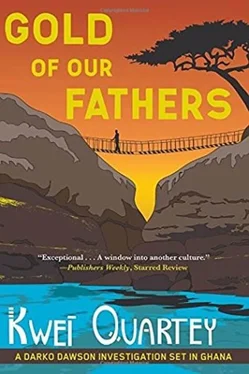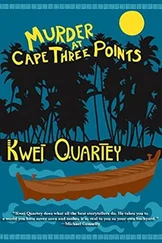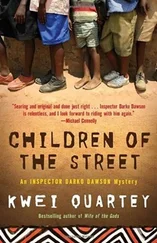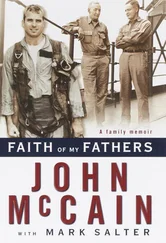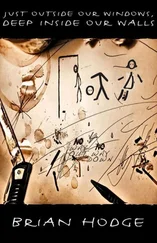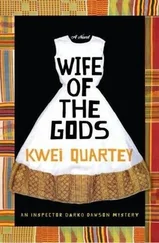Sackie returned as Dawson was taking pictures of the ligature marks on Wei’s wrists and ankles.
“Someone is bringing the bags for you, sir,” Sackie said.
“Thank you. How is the victim’s brother doing?”
“He’s just sitting there saying nothing.”
“Tell Obeng to escort him back to the taxi and wait for us. I’m going to look at the other site. When the bags arrive, I want these ligatures collected, all the clothes, the pots and pans, the shotgun, and the bucket. Please don’t throw the water out. There could be traces of blood in it.”
“Yes, sir.”
Dawson walked back to take a look at the site’s lone excavator resting high on the crest of the collection of pits. It was sullen yellow in color and caked with mud. The long boom attached to the hydraulic arm and the intimidating claw bucket bore the manufacturer’s name-XCMG. Chinese make, Dawson supposed. He turned to look around, the slight elevation affording him a better view. Several hundred meters away in the dry, unforgiving laterite where only the hardiest plants grew, two Toyota pickups were parked at an angle to each other. Dawson assumed that they belonged to the Chinese brothers.
He took a walk down to look the trucks over. They were similar, although different models. One of them, dull charcoal in color, looked like it had taken quite a beating on bad roads. The other, clearly a newer pickup, was metallic red. Dawson tried the doors, but both were locked. The inside of the charcoal vehicle was full of trash and discarded food cans. The red one was decent. Dawson looked closely at the truck beds for any signs-especially bloodstains-that the vehicle had transported Bao’s body from another location. He couldn’t find anything, but whichever pickup belonged to the victim would have to go to the Motor Traffic Unit (MTU) at Regional Headquarters in Kumasi for further examination.
Returning to the site where the body had been dug out, Dawson saw a man and woman alighting from a silver-gray Toyota Prado at the edge of the site, where the crowd had now thinned out to just a half dozen or so. The man had a TV camera on his shoulder. Dawson made short work of the space between him and them.
“There’s no filming allowed,” he called out as he approached them. “This is a fresh crime scene we are still investigating. Please put the camera away.”
The man hesitated and didn’t quite obey.
“And who might you be?” the woman asked.
“Detective Chief Inspector Darko Dawson. And you are?”
“Good morning, Chief Inspector. Akua Helmsley. Environmental reporter for The Guardian newspaper. I’m doing a documentary on illegal gold mining in Ghana.”
She had a British accent. Her skin was fair and flawless. She was tall for a woman-just a couple of inches shorter than Dawson. She gestured to the man behind her. “That’s my cameraman, Joshua Samuels.”
“Please, Mr. Samuels,” Dawson said, “put the camera back in the vehicle.”
Sullenly, Samuels put the camera down in the front passenger seat.
“What are you doing here?” Dawson asked Helmsley.
She seemed to smile somewhat as she considered him, as if a little amused. He didn’t let it bother him.
A light breeze lifted her flowing black hair slightly off her shoulders. “You’ve got a dead Chinese man, I understand, Chief Inspector,” she said. “Do you know who he is?”
“The investigation is only in its preliminary stages,” Dawson said. “I know almost nothing about him.”
“He was buried in that mound of mud over there?” she asked, pointing.
“Yes. How did you know?”
“Your Sergeant Obeng told me,” she said, flashing a smile. She was almost too pretty to be surrounded by this wrecked landscape. “I met him back at the taxi where he’s holding the suspect.”
Evidently, Obeng had let her charm information out of him . How annoying.
“Definitely homicide, I suppose?” she said.
“Nothing is definite yet,” he countered. Her knowing tone was getting on his nerves. “We have to get the body to the mortuary for a full autopsy.”
“Ah,” she said. “Are you aware just how backed up they are with bodies at the KATH mortuary?”
“Yes, of course,” he said, matching her self-assuredness. “All hospital mortuaries in Ghana are backed up.”
She smiled again, her eyes shrewd and dazzling. “I like ‘detective chief inspector’ on you. It suits you well. You say we can’t film the crime scene. What about still photos?”
“You can take photos of the surrounding area”-he pointed in all directions-“but not the crime scene itself.”
“But it’s so common in Ghana even to see photos of murdered victims right on the front page of a newspaper,” she pointed out.
That was true. “Yes, and I hate that,” Dawson said. “Bad police work.”
“I’m impressed,” she said. “Nice to meet someone who knows best practice. I’ve been back and forth to the Ashanti Region from England regularly over the past year, but I’ve never met you. Are you new around here?”
“I was transferred here from CID Central in Accra-arrived only yesterday. What is your documentary about?”
“It’s an in-depth look at all aspects of the gold mining industry in Ghana, but particularly the phenomenon of the mass influx of Chinese illegals.”
Dawson saw his opportunity. “Maybe you can explain how this Chinese invasion happened, Miss Helmsley, because I don’t understand it well.”
“Okay,” she said, propping a foot on a fallen, decaying tree trunk. Her jeans were a snug fit, and Dawson noticed the fine curve of her hamstring muscles. “Quick tutorial. Ready? The people of Shanglin County in China’s Guangxi Province have had a gold-mining tradition for centuries. Basically, they mined their own land dry as a bone, so they began looking elsewhere in China to get their gold. But the Chinese government said, ‘Oh no you don’t. We’re not giving out licenses to small fries like you. Go somewhere else.’”
“And so they heard that Ghana was the second highest gold producer in Africa and came running here?” Dawson asked sardonically.
“More or less,” she said. “Stories circulated in China about miners coming to Ghana for gold and returning home as millionaires. Much of it could have been urban legend, but they called the thousands of Shanglin miners flocking to Ghana the ‘Shanglin Gang.’”
“And all of them are illegal?”
“Yes, because it’s illegal for foreigners to engage in galamsey, or small-scale surface mining-whatever your term of preference. But who cares, right? Visa brokers in Ghana can get on-arrival visas for incoming Chinese workers by bribing officials in the Ghana Immigration Service. There’s also a trafficking system involving Togo and other countries.”
Dawson shook his head slowly, feeling a stab of anger over the depth of the corruption involved. “All the trouble they go through must be worth its weight in gold,” he commented.
“Nice one, Chief Inspector,” Helmsley said. “It’s true. Even though western mining companies like AngloGold with its massive deep mining sites produce more than seventy percent of Ghana’s gold and the galamsey contribute less than thirty, the Chinese illegals do well. And so do a lot of other people. The landowner and the local chiefs get paid by the Chinese, and unemployed Ghanaian kids hanging around the villages get to do some work and earn some money.”
“No wonder the illegal Chinese guys get to stay,” Dawson murmured, understanding the picture more completely now. He gestured to the ravaged landscape. “They are useful to us at the expense of mother Ghana.”
“Yes,” Helmsley agreed. “Just the way it’s been since at least the fifteenth century.” She and Dawson held glances for a moment. “I think we’ll take our leave now, Chief Inspector… Oh, just one thing. I’d like to exchange numbers if possible. I may need to get in touch with you on another occasion.”
Читать дальше
